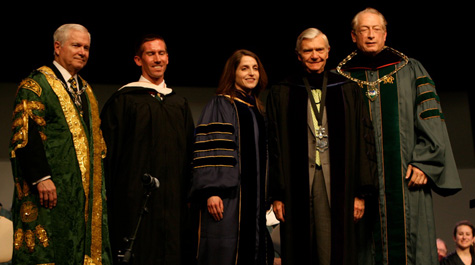3L Jeffrey Bozman's Charter Day remarks laud Professor Heymann's extraordinary dedication to students
Third-year law student Jeffrey Bozman gave the following remarks about Thomas Jefferson Teaching Award recipient Laura Heymann at William & Mary's Feb. 3 Charter Day celebration. -Editor
It's my honor to introduce Professor Laura Heymann as she receives the Thomas Jefferson Teaching Award. The award was established as a tribute to those teachers who, through encouragement and example, helped to shape Jefferson's education during his years at the College. The award honors younger members of the faculty who have inspired in their students a love of learning.
As you know, Professor Heymann is the first law professor to win the award. It's fitting that we honor her today with the "Thomas Jefferson" teaching award, since the namesake of our law school, George Wythe, was Jefferson's own teacher. Law professors from Wythe to Heymann have terrified their students by examining cases through the Socratic Method, a horrifying style of interactive public speaking. So when I was asked, so to speak, to "brief the case" of Laura Heymann's teaching career, my first reaction was to break out in a cold sweat. Fortunately, one develops thick skin over the course of three years, and today my case is quite easy. Professor Heymann: in the next minute or so, I will provide the facts of your brilliant contributions to the Law School, the reasoning behind this well-deserved award, and the future implications for the many students you have inspired during your tenure at William & Mary.
First, the facts, which are uncontroverted: you are brilliant. You demonstrated talent as a publisher, judicial clerk, litigator, in-house counsel, and intellectual property scholar. As evidence of these achievements, I note that you have published in some of the country's most prestigious law journals, and that you have already received awards for your achievements as a teacher.
Next, the reasoning behind this particular award. We start with your skill as an educator. I first met you in 2009 when I was an applicant to the Law School. I was a guest in your Torts class, and I was amazed to watch you engage 80 students in a genuinely enthusiastic lecture on fine points of proximate causation. I knew then that I was watching an exceptional teacher, but I didn't realize - though the signs are apparent in retrospect - that I was meeting someone whose support and encouragement would have such a profound impact on me during my years here at William & Mary.
As you've taught us, the reasoning of a case is seldom simple. Your teaching skills are elements "necessary but not sufficient" to explain this award. The Law School is blessed with many great teachers, so we dig deeper to identify the exceptional characteristics that we celebrate today. I submit that the justification lies in your extraordinary dedication to your students. You are always the first to congratulate us on our achievements, no matter how small. Not only do you celebrate our successes, but you also inspire perseverance in difficult times. Your students trust you implicitly, so we often come to you for advice. A glance around your office shows many mementos of the people you have helped. You have been a mentor to so many of us, and an advocate for some of us in times when we could not speak for themselves.
Setting such a magnificent example with your brilliance, skill, and compassion captures the essence of George Wythe's concept of the citizen lawyer. When he resolved: "Here we will form such characters as may be useful in the national councils of our country," the "we" referred to the teachers. Thomas Jefferson was fortunate to have George Wythe, and we are so grateful for you.
Your values as a lawyer and a citizen - especially your commitment to human rights and equal justice under law - are values to which I aspire professionally and for which I am personally grateful. Professor Heymann, on behalf of all your students, I am delighted to celebrate this occasion with you. Ladies and gentlemen, please join me in welcoming and congratulating the Class of 2014 Professor of Law, Laura Heymann.



